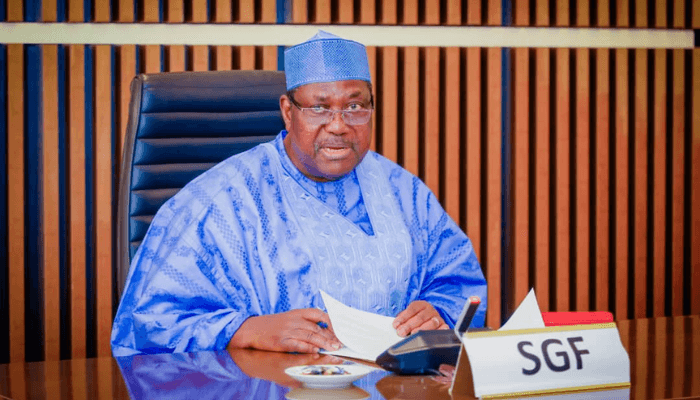North Central key to Nigeria’s non-oil export growth – Akume
George Akume, Secretary to the Government of the Federation (SGF), has said that the vast economic potential of Nigeria’s North Central region positions it as a strong hub for driving the country’s non-oil export growth.
Akume stated this in Jos, the Plateau State capital, while commissioning the Senator George Akume 250-seater Conference Centre at the North Central Zonal Office of the Nigerian Shippers’ Council (NSC).
He noted that the region’s rich mineral deposits and strong agricultural base give it a strategic advantage in advancing national economic diversification.
The North Central region, widely recognised for its vast potential in agriculture and solid minerals, has, however, faced significant security challenges in recent years.
Akume expressed optimism that with sustained improvements in security, logistics, and transport infrastructure, the zone could play a leading role in boosting Nigeria’s non-oil export sector.
“With improved logistics infrastructure, this region can become a key driver of Nigeria’s diversification agenda,” he said.
Akume commended the Nigerian Shippers’ Council and the Ministry of Marine and Blue Economy for what he described as “a testament to commitment and vision” in strengthening Nigeria’s logistics and maritime system.
“This edifice is not just a building; it is a statement of vision, a testament to commitment, and a reflection of the renewed energy driving Nigeria’s port and logistics system under the leadership of President Bola Ahmed Tinubu,” the SGF stated.
He noted that across the world, economic progress is built on solid infrastructure, adding that efficient ports, roads, railways, and dry ports are “the arteries through which the lifeblood of commerce flows.”
Akume reiterated that the federal government, under the Renewed Hope Agenda of President Bola Tinubu, is prioritising investment in critical transport and trade infrastructure across all regions of the country — from the coastlines to the hinterlands — to boost connectivity and competitiveness.
“We are building an economy that thrives on connectivity,” he said.
“An economy where a farmer in Benue can ship produce seamlessly to Lagos Port, and an exporter in Jos can access global markets without unnecessary bottlenecks.”
The SGF lauded the Shippers’ Council ably led by Pius Akuta, its executive secretary, for its role as the Port Economic Regulator, promoting fairness, efficiency, and innovation in the maritime sector.
He particularly praised the Council’s effort in bridging the gap between seaports and inland regions through the development of Inland Dry Ports and zonal coordination offices.
Read also: BOI pushes ESG adoption to drive sustainable industrial growth
According to him, the newly commissioned conference centre will serve as a hub for stakeholder engagement, policy dialogue, and capacity building, thereby strengthening Nigeria’s maritime and logistics ecosystem.
He therefore, called for stronger partnerships between government, the private sector, development partners, and host communities to sustain the gains of infrastructure development.
“Government cannot achieve this vision alone,” he stressed. “Let us view infrastructure not merely as government projects, but as national assets that require protection, maintenance, and innovation.”

